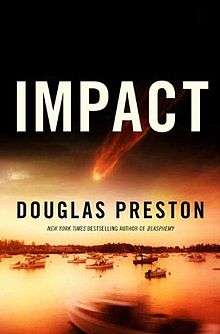
Impact (novel)
Impact is a science fiction thriller novel by American writer Douglas Preston, published on January 5, 2010 by Forge Books. The novel is the third book in the Wyman Ford series. The book was reviewed on All Things Considered in February 2010.
Plot summary
Ex-CIA agent Wyman Ford returns to Cambodia to investigate the source of radioactive gemstones and uncovers an unusual impact crater. A young woman on the other side of the world photographs a meteoroid's passage in the atmosphere with her telescope and deduces that it must have struck on one of the islands just offshore from Round Pond, Maine. A NASA scientist analyzing data from the Mars Mapping Orbiter (MMO) spots unusual spikes in gamma ray activity. These threads intersect with discovery of an alien device that has apparently been on Deimos, one of the two moons of Mars, for at least 100 million years. Something has caused it to activate and fire a strangelet at Earth, setting off the events in the novel.
Timeline
The events in this novel follow those of The Codex, Tyrannosaur Canyon, and Blasphemy. As such, Wyman Ford is the protagonist once again (having appeared in Tyrannosaur Canyon and Blasphemy), and the character of Stanton Lockwood III (who debuted in Blasphemy) also returns.
Impact
Impact may refer to:
In science:
In development:
In computing:
In film, television and radio:
In literature:
Impact (comics)
Impact, in comics, can refer to:
See also
Damon Harris
Damon Harris (born Otis Robert Harris, Jr., July 17, 1950 – February 18, 2013) was an African-American soul and R&B singer, most notable as a member of The Temptations from 1971 to 1975. Twenty years old when he joined the group, Harris was the youngest member of The Temptations during his tenure in the group. As a teenager Harris had formed a Temptations tribute band named The Young Tempts (aka The Young Vandals). The group had charted singles released on T-Neck Records, and later had a few minor hits under the name Impact. He also was instrumental in his former singing group partner, Billy Griffin, getting the opportunity to replace Smokey Robinson in The Miracles. Harris later founded, and became the CEO of, The Damon Harris Cancer Foundation dedicated to promoting the awareness, diagnosis, and treatment of prostate cancer.
Biography
The Young Tempts/The Young Vandals
As a teenager growing up in Baltimore, Maryland, Otis Harris, Jr. was a major Temptations fan, and idolized in particular the group's falsetto, Eddie Kendricks. Patterning himself after Kendricks, Harris and his friends John Quinton Simms, Charles Timmons (also known as Kareem Ali, who went on to perform with Glenn Leonard's Temptations Revue), and Donald Knute Tighman, formed a Temptations-inspired vocal group during his high school years called The Young Tempts ("Tempts" being a nickname for the Temptations). The Young Tempts recorded covers of two 1966 Temptations' songs, "I've Been Good to You" (a song originally recorded by The Miracles), and "Too Busy Thinking About My Baby," for The Isley Brothers' T-Neck Records in 1970. Motown Records filed an injunction against T-Neck because of the group's name; the 45 was withdrawn and re-issued with the group credited as The Young Vandals, and reached #46 on the R&B charts.
Moon of Israel (novel)
Moon of Israel is a novel by Rider Haggard, first published in 1918 by John Murray. The novel narrates the events of the Biblical Exodus from Egypt told from the perspective of a scribe named Ana.
Haggard dedicated his novel to Sir Gaston Maspero, a distinguished Egyptologist and director of Cairo Museum.
Adaptation
His novel was the basis of a script by Ladislaus Vajda, for film-director Michael Curtiz in his 1924 Austrian epic known as Die Sklavenkönigin, or "Queen of the Slaves".
References
External links
Novel (disambiguation)
A novel is a long prose narrative.
Novel may also refer to:
See also

1633 (novel)
1633 is an alternate history novel co-written by Eric Flint and David Weber, and sequel to 1632 in the 1632 series. 1633 is the second major novel in the series and together with the anthology Ring of Fire, the two sequels begin the series hallmarks of being a shared universe with collaborative writing being very common, as well as one—far more unusual— which mixes many canonical anthologies with its works of novel length. This in part is because Flint wrote 1632 as a stand-alone novel, though with enough "story hooks" for an eventual sequel, and because Flint feels "history is messy", and the books reflect that real life is not a smooth polished linear narrative flow from the pen of some historian, but is instead clumps of semi-related or unrelated happenings that somehow sum together where different people act in their own self-interests.
Premise
The series begins in the Modern era on May 31, 2000, during a small town wedding when the small West Virginia town of Grantville trades places in both time and geographic location with a nearly unpopulated countryside region within the Holy Roman Empire during the convulsions of the Thirty Years' War.
Podcasts:

